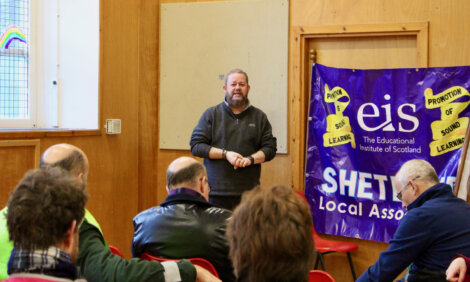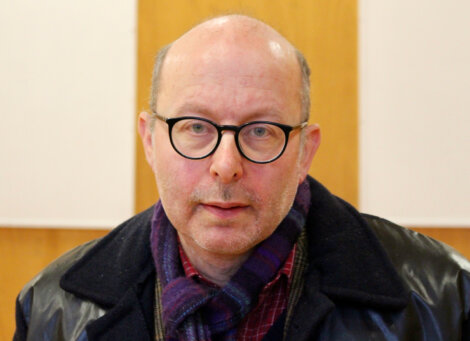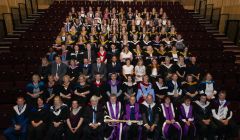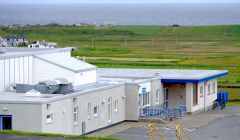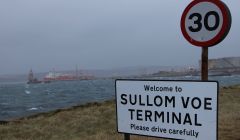Education / Teachers take ‘sacrifice’ to strike again – but no resolution yet to pay dispute
Secondary teachers formed a picket line in Lerwick this morning as union members made their voices heard
“WE don’t want to be striking – we would rather be in the class.”
That was the message from one teacher taking part in the picket line in Lerwick today (Wednesday) as secondary staff went on strike again in a national dispute over pay.
For Irvine Tait, who has taught at Brae High School for more than two decades, striking is something of a last resort. But teachers across the country feel there is no other option than to make a stand.
“I think that yesterday’s strike action by primary colleagues was successful,” the EIS union member said. “I think today’s action here in Shetland has been successful, contributing to the national campaign.
“Obviously this is about pay, and it’s about living standards. The EIS like other unions is taking action to protect its members and really the ball is in [local government association] COSLA and the Scottish Government’s court – if they come up with a decent offer, we can get a settlement and get back to work, which is what we want to do.”
Between 20 or 30 people turned out early on Wednesday morning near the Anderson High School to form a picket line as secondary departments shut to pupils for the day.
The strike – which followed action by primary teachers on Tuesday, as well as a one-day effort in November – comes as unions seek a ten per cent pay offer for staff. The last approach from the Scottish Government was five per cent, and with inflation soaring the message is that this is not a real terms rise.
Local EIS rep Matthew Moss said at a meeting held following the picket line that “we got a lot of public support, a lot of beeps” that morning.
Become a member of Shetland News
Union members were told by Moss, though, to be prepared for further strike action.
“Unfortunately, there’s been no progress [on the pay offer], and until we get some progress on that, we’re committed to continuing with this industrial action,” he told Shetland News.
Unless things change then there will be further action by primary and secondary teachers in Shetland on 6 February as EIS members across Scotland take turns striking over the coming weeks.
But Moss and Tait said there are a myriad of issues at play in the teaching sector in Scotland, including recruitment and retention, and many of these could end up impacting the delivery of education.
“In terms of morale in general across the profession, and that includes Shetland, there’s huge issues around workload, huge issues around unnecessary bureaucracy caused by outside agencies like Education Scotland and the SQA,” Moss said.
“And in addition to that we have a recruitment crisis. We’ve got lots of empty positions not being filled, we’ve got teachers leaving the profession early, and we’re not attracting as many graduates.
“For the first time in five years the number of teachers in Scotland has fallen, yet the number of pupils has risen. That means larger classes, more workload and obviously the impact on education.”
Tait said that when strikes occur, “it’s very much when negotiations have broken down”.
“Our members make a sacrifice taking strike action,” he continued. “We don’t want to be striking – we would rather be in the class. But we have a retention and recruitment problem, and I want to say to parents and pupils – we need to get teachers in the class, and we need to keep the teachers that we have.
“Unfortunately in Scotland and to some extent locally we’re now finding it difficult to recruit and retain.
“That’s not in pupils’ interests and parents’ interests, because really our working conditions are people’s learning conditions, and a good pay settlement here will make teaching a more attractive option, and that can only be good for getting people in the profession – and that’s what kids need.”
Last minute talks over the pay offer for teachers failed to avert this week’s strike action, although Scottish education secretary Shirley-Anne Somerville said they were “constructive”.
However she told the Scottish Parliament this week that the various parties were “still some distance apart”.
“The pay demands that we are having from our trade union colleagues are simply unaffordable for the Scottish Government, working on a fixed budget, already allocated, also eroded by inflation, and that does make it a very difficult and challenging process to make to a conclusion and a resolution on,” the MSP said.
Somerville added that the government will “leave no stone unturned” in attempting to reach a resolution.
Become a member of Shetland News
Shetland News is asking its many readers to consider paying for membership to get additional features and services: -
- Remove non-local ads;
- Bookmark posts to read later;
- Exclusive curated weekly newsletter;
- Hide membership messages;
- Comments open for discussion.
If you appreciate what we do and feel strongly about impartial local journalism, then please become a member of Shetland News by either making a single payment, or setting up a monthly, quarterly or yearly subscription.


































